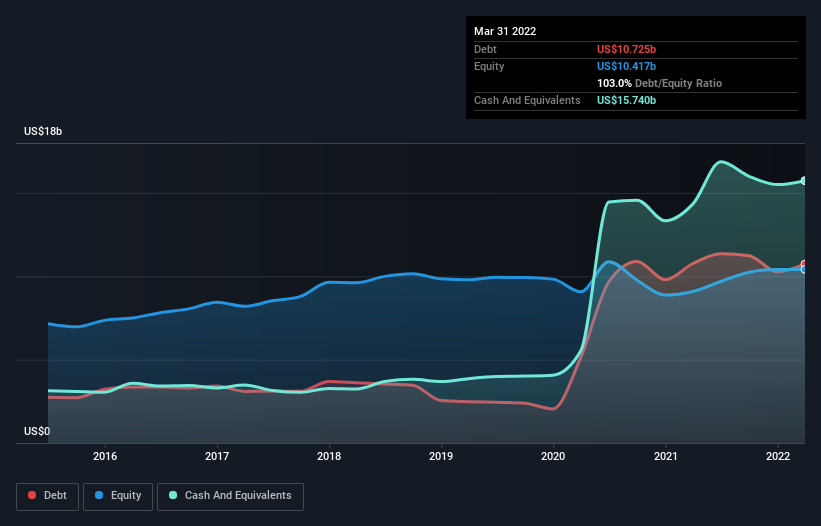- United States
- /
- Airlines
- /
- NYSE:LUV
Health Check: How Prudently Does Southwest Airlines (NYSE:LUV) Use Debt?

Howard Marks put it nicely when he said that, rather than worrying about share price volatility, 'The possibility of permanent loss is the risk I worry about... and every practical investor I know worries about.' When we think about how risky a company is, we always like to look at its use of debt, since debt overload can lead to ruin. Importantly, Southwest Airlines Co. (NYSE:LUV) does carry debt. But the real question is whether this debt is making the company risky.
When Is Debt A Problem?
Debt and other liabilities become risky for a business when it cannot easily fulfill those obligations, either with free cash flow or by raising capital at an attractive price. Part and parcel of capitalism is the process of 'creative destruction' where failed businesses are mercilessly liquidated by their bankers. While that is not too common, we often do see indebted companies permanently diluting shareholders because lenders force them to raise capital at a distressed price. By replacing dilution, though, debt can be an extremely good tool for businesses that need capital to invest in growth at high rates of return. When we examine debt levels, we first consider both cash and debt levels, together.
Check out our latest analysis for Southwest Airlines
What Is Southwest Airlines's Net Debt?
As you can see below, Southwest Airlines had US$10.7b of debt, at March 2022, which is about the same as the year before. You can click the chart for greater detail. However, it does have US$15.7b in cash offsetting this, leading to net cash of US$5.02b.

How Strong Is Southwest Airlines' Balance Sheet?
Zooming in on the latest balance sheet data, we can see that Southwest Airlines had liabilities of US$10.1b due within 12 months and liabilities of US$16.8b due beyond that. Offsetting this, it had US$15.7b in cash and US$1.69b in receivables that were due within 12 months. So it has liabilities totalling US$9.41b more than its cash and near-term receivables, combined.
While this might seem like a lot, it is not so bad since Southwest Airlines has a huge market capitalization of US$22.4b, and so it could probably strengthen its balance sheet by raising capital if it needed to. But we definitely want to keep our eyes open to indications that its debt is bringing too much risk. While it does have liabilities worth noting, Southwest Airlines also has more cash than debt, so we're pretty confident it can manage its debt safely. When analysing debt levels, the balance sheet is the obvious place to start. But ultimately the future profitability of the business will decide if Southwest Airlines can strengthen its balance sheet over time. So if you're focused on the future you can check out this free report showing analyst profit forecasts.
Over 12 months, Southwest Airlines reported revenue of US$18b, which is a gain of 168%, although it did not report any earnings before interest and tax. So there's no doubt that shareholders are cheering for growth
So How Risky Is Southwest Airlines?
While Southwest Airlines lost money on an earnings before interest and tax (EBIT) level, it actually booked a paper profit of US$583m. So when you consider it has net cash, along with the statutory profit, the stock probably isn't as risky as it might seem, at least in the short term. One positive is that Southwest Airlines is growing revenue apace, which makes it easier to sell a growth story and raise capital if need be. But we still think it's somewhat risky. When analysing debt levels, the balance sheet is the obvious place to start. But ultimately, every company can contain risks that exist outside of the balance sheet. These risks can be hard to spot. Every company has them, and we've spotted 3 warning signs for Southwest Airlines you should know about.
If you're interested in investing in businesses that can grow profits without the burden of debt, then check out this free list of growing businesses that have net cash on the balance sheet.
New: Manage All Your Stock Portfolios in One Place
We've created the ultimate portfolio companion for stock investors, and it's free.
• Connect an unlimited number of Portfolios and see your total in one currency
• Be alerted to new Warning Signs or Risks via email or mobile
• Track the Fair Value of your stocks
Have feedback on this article? Concerned about the content? Get in touch with us directly. Alternatively, email editorial-team (at) simplywallst.com.
This article by Simply Wall St is general in nature. We provide commentary based on historical data and analyst forecasts only using an unbiased methodology and our articles are not intended to be financial advice. It does not constitute a recommendation to buy or sell any stock, and does not take account of your objectives, or your financial situation. We aim to bring you long-term focused analysis driven by fundamental data. Note that our analysis may not factor in the latest price-sensitive company announcements or qualitative material. Simply Wall St has no position in any stocks mentioned.
About NYSE:LUV
Southwest Airlines
Operates as a passenger airline company that provides scheduled air transportation services in the United States and near-international markets.
Solid track record with adequate balance sheet.
Market Insights
Community Narratives



